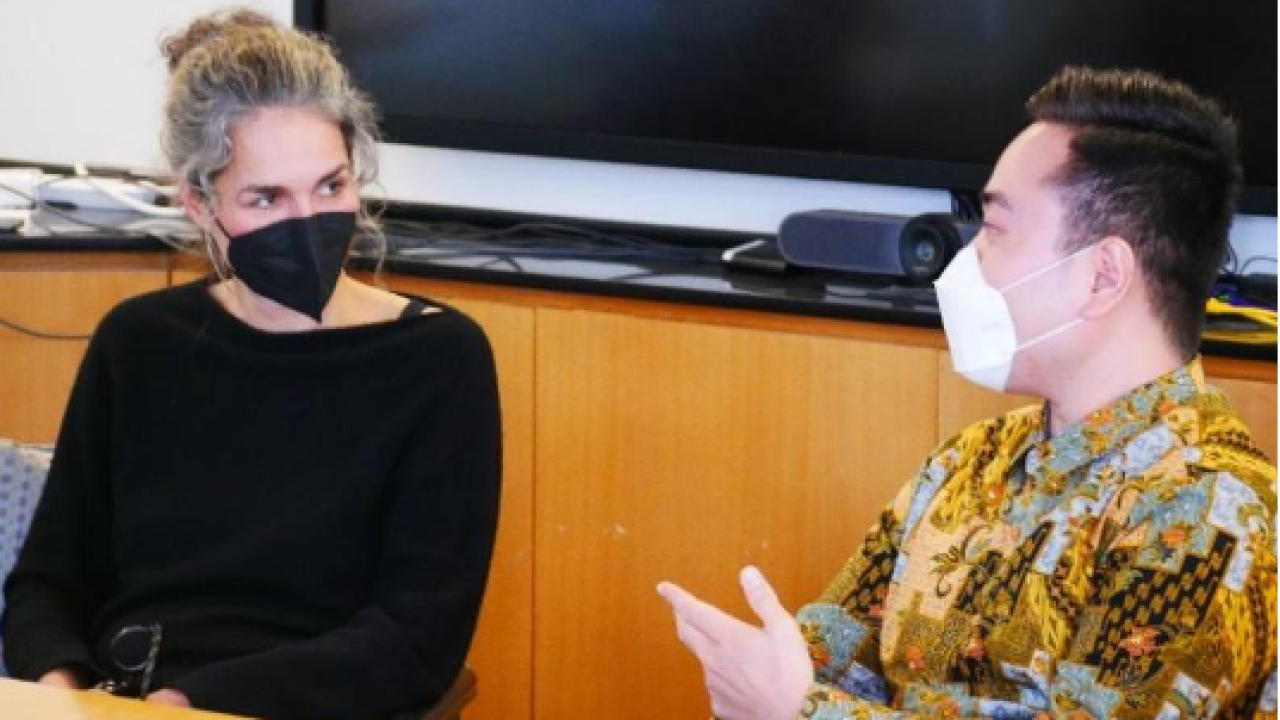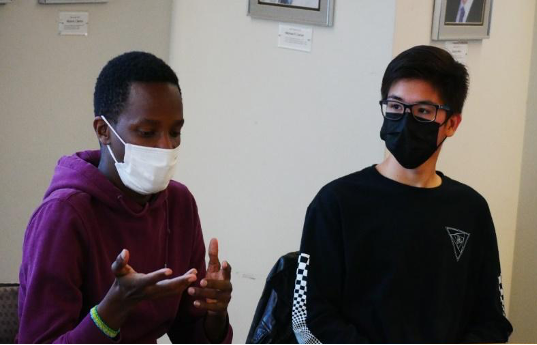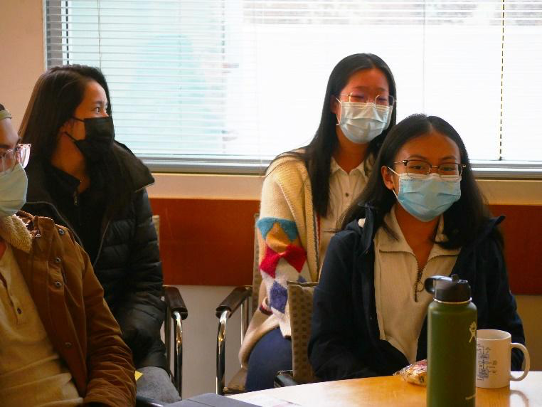
Reflections on Service-Learning in Unusual Times
I became one of the inaugural Community Engaged Learning Faculty Fellows (CELFFs) at the end of 2019. The turmoil of the last two years and my experienced losses have challenged me in ways I still find hard to put in words. But it also helped me gain new insight and further shaped my identity as a public scholar.
A Year of Pivoting
I was thrilled to be part of this new group dedicated to community-engaged learning and ready to explore new experiential learning opportunities for my students. However, once the pandemic hit, this wonderful support and recognition of faculty incorporating real world problems into their classrooms suddenly felt ill timed. Not only did we find ourselves in front of cameras teaching from our homes rather than in classrooms, I had also proposed to explore, create and integrate internship opportunities for students enrolled in my Cooperative Business Enterprises course (ARE 132). My ideas critically depended on in-person networking and the building of relationships with industry partners and experts, and ultimately aimed at creating hands-on learning opportunities for students physically present in professional work environments.
Teaching about cooperatives offers me an opportunity to broaden students’ understanding of business operations and strengthen their competence as applied economists in a way that feels relevant to students from diverse backgrounds. I can communicate a different side of economics, especially to those questioning traditional structures and seeking value-based professions.
A cooperative is an organization or business that is owned by its members, who are also its users and decision makers. Cooperatives’ owners are pursuing economic, social, and political goals and an exploration of the history of cooperatives reinforces the notion that they form out of necessity. They ensure that communities have access to goods and services that were missing or unattainable to many members and help tackle debt, poverty, and unemployment. Cooperatives have given women, people of color, and immigrants a voice and a path to economic self sufficiency.
My previously developed partnerships with industry representatives allowed me to invite guest speakers and bring more theoretical approaches and concepts to life. I was also able to promote a number of internships and explore additional funding opportunities; however, by the end of the 2020 winter quarter, all internships were canceled and my initial progress toward developing my envisioned internship program seemed insignificant.
As I pivoted and quickly developed content to move my courses online and tried to support students and colleagues as best I could, I myself felt increasingly uncomfortable and unsure about how to continue to teach. A teenager's cell-phone video captured and amplified George Floyd’s desperate cries for help, and African-American communities for whom the portrayed police brutality was nothing new, were joined by protestors of many races, ethnicities, backgrounds and cultures in their call for justice. I, too, renewed my commitment to diversity, equity, and inclusion; but, I was unsure how to express my empathy and best serve as an ally. I knew I was far from being an expert on the Black experience. Still, I wondered, what role we, as faculty and applied economics scholars, could and should play?
The Value of Being a Lifelong Learner
In some ways, my participation in the Public Scholarship and Engagement (PSE) program and the regular meetings with other fellows from diverse disciplines under the leadership of PSE staff, couldn’t have come at a better time. I had embraced active and experiential learning techniques in my teaching; however, I wasn't familiar with the term service-learning prior to 2020. Service-learning can best be understood by starting with its purpose–its why, rather than what it is. It goes beyond community service and experiential learning as related concepts from which it draws, and instead tries to achieve or strike a balance between student learning and community outcomes. It insists not only on reflection, but also reciprocity. It demands not only active engagement and joint exploration of practical solutions, but also a constant role reversal of who is viewed as the service provider and as the learner.
When students ask me why I became a professor, I often answer that becoming a professor simply seemed like the second best thing to being a student. I tell them that I just really enjoy learning and that, although I haven’t found definite answers, I have been able to continuously refine my questions. Nevertheless, as I have progressed in my academic career, I increasingly measure my achievements by the quantity and quality of my research and the services I provide to our students, my profession, and larger communities. My involvement in PSE, the intellectual discourse with service-learning coupled with my renewed commitment to diversity and inclusion allowed me to acknowledge this disconnect and refocus on why I became a professor.
The ever-changing pandemic meant that preparing for classes took considerably longer and that I took on additional service responsibilities. My progress on my research projects slowed down, and like many, I felt overwhelmed by new demands and like I was falling further behind. I am only now fully realizing that my biggest and most important achievements during the past two years have been in my role as a learner.
Prior to the spring of 2020, I hadn’t seen clearly enough that unjust killings of Black people continued at alarming rates. While I was aware of the existing disparities in health care, housing, food insecurity and opportunities for education, I had not yet understood and more openly acknowledged that despite my own struggles, I had succeeded in academia in part because of white privilege.
The assigned readings, regular conversations with my CELFF colleagues, and my reflections on what service learning really means, all strengthened my belief that faculty and students in the Agricultural and Resource Economics department could play a vital role in increasing diversity in our discipline and academia overall.
Economics as an academic discipline and profession is home to disproportionately few historically underrepresented minority groups and women. The area of study itself, its terminology and modeling of economic decisions and complex systems of power, can be a deterrent for people who historically felt alienated from or disadvantaged within economic systems. Its rigor and ever advancing analytic tools further challenge students and make economics less accessible to students from diverse educational backgrounds. Yet, its analytic rigor is precisely why I am convinced that applied economists can become agents of the type of change that is so urgently needed. What I value most about economics is the constant evaluation and emphasis on consistency of both arguments and outcomes. When enriched by a variety of perspectives and research questions, the economic way of thinking creates a system of checks and balances that allow us to focus on learning from each other without taking critical feedback personally.
Making Change
I grew up in Berlin and witnessed the fall of the Berlin wall as a teen. When my parents and I moved to Munich shortly after, I realized for the first time how much we are affected by our experience and available information sets. Having spent my childhood in the East and now living in the West, I could understand the grievances and still existing tensions between people in a formerly divided Germany. My fascination with the power of information grew; but, I also started to suspect that provision of information alone doesn’t imply learning and that availability of information rarely induces changes in behaviors. The way information is presented and by whom, coupled with our personal experiences of the past, can intentionally or inadvertently influence the accessibility of information, our perceptions, and the choices we make.
Behavioral economics, a more recently established subfield of economics, continues to broaden the decisions economists study and enriches not just my own research. This increasingly more prevalent approach enables integrating psychological, cognitive, emotional, cultural and social factors into traditional economic analyses that tend to focus on monetary constraints and considerations of wealth. As such, it complements classical theories of decision-making by individuals and institutions. Studying economics can not only improve our ability to critically reflect on our own disconnects between the core values we hold and the choices we make. It also allows us to collectively evaluate current information asymmetries, financial constraints and institutional barriers. Economists can become choice architects and nudge people in the direction of change.
The CELFF fellowship, my subsequent participation in the Asking Different Questions Scholars Program and the encouragement of many of my colleagues ultimately led me to commit to changing my focus and thinking bigger than to continuously redesign the courses I teach. On behalf of our department, my colleague Steve Boucher and I, submitted a proposal for a new Diversity and Inclusion in Research, Education, and Career Training (DIRECT) Program under the University of California-Hispanic Serving Institutions Doctoral Diversity Initiative (UC-HSI DDI) in the beginning of 2021.
Elinor Ostrom, whose work on economic governance and the evolution of institutions for collective action that I cover in ARE 132 and who became the first women to be awarded the Nobel prize in Economics, serves as a powerful example of how current program structures might exacerbate rather than reduce barriers to entry for many talented students. Discouraged from studying trigonometry in high school and after completing her undergraduate degree as quickly as she could while working to pay her tuition, her application to a doctoral program in economics was turned down due to her limited exposure to and knowledge of calculus.
Doctoral diversity in economics ultimately needs to be addressed through a revision of our undergraduate programs, and we need to reach out to prospective students even before they arrive on college campuses.
The overarching goal of the DIRECT program is to expose students from diverse backgrounds to applied economics research early on, and to encourage and better prepare them for success throughout their academic careers. It seeks to connect prospective, undergraduate, and graduate students, as well as faculty via multi-level, mentee-mentor networks that build community and provide mutually beneficial learning and research opportunities for all program participants.

Our uniquely structured undergraduate program can attract a broader set of students with interests in both business and public policy as many students know little about economics as an academic discipline when starting to think about college. Yet, the mathematical foundations of our lower division core classes challenge many students and they don’t intuitively connect with our initial focus on supply and demand theory. Even our best students only begin to appreciate the economic way of thinking when they take upper-division electives or engage in economic research. And, depending on their personal backgrounds, support systems and resources already available to them, even these students might need additional training and mentorship to successfully apply and thrive in highly-ranked doctoral programs like the one we offer. While our master’s program can successfully prepare students for a PhD and bridge gaps, too few of our own undergraduate students know about it or perceive graduate school as a financially viable option.
Having received five years of funding, we are currently implementing our proposed ideas. We have started to reach out to our Community College partners to expose students to applied economics research and professional careers even before they transfer to UC Davis. Once arriving in our major, students will be supported with additional mathematical training and targeted financial aid. Students further actively participate in research from the very beginning and I envision implementing a constant role reversal of mentor and mentee among our program participants that ultimately can create a greater sense of inclusion and belonging for African American, Hispanic and Native American (AHN) students of diverse genders.[1]
Respect for Each Person’s Story
In collaboration with Sarah Rebolloso McCullough from the Feminist Research Institute and Kem Saichaie with the Center for Educational Effectiveness, we are further designing a modular training program that will allow both Ph.D. students and faculty to reflect critically on the complex roles of race and structural inequality in research, teaching, and mentorship within the field of economics to better prepare them for their active participation in the DIRECT program.
And finally, we opened our Student Café last fall. For two hours each week, we converted our conference room into a welcoming environment for our undergraduate students. Offering free coffee and snacks, we had and listened to countless conversations.
Students interacted with peers and solicited advice from faculty and graduate students about how to successfully apply for internships and jobs. Through their questions and shared experiences, I was reminded that most had a limited understanding of economics as a social science, and perceived economic class content as mostly theoretical. Those with graduate school ambitions primarily considered professional schools as being the necessary stepping stone for better professional opportunities and the pursuit of leadership positions in industry.

While some students gained new perspectives when faculty shared their research in mostly upper-level elective courses, or through their participation in our Undergraduate honors thesis program. I was powerfully reminded that even those students have a very limited knowledge of careers in academia in general, and of our department’s master’s and doctoral programs in particular.
Janet Yellen, who currently serves as the 78th Secretary of the Treasury and previously chaired the Federal Reserve, knew little about economics when she started college and stumbled upon it as an academic field almost by accident. Yellen, who thought she would become a math major when starting college, describes her first encounter with economics in an introductory course as love at first sight. But that might be more of an exception than the rule, and certainly isn’t my story either. It took the encouragement of many wonderful mentors, the search for meaning in my personal experiences and the exposure to interdisciplinary research that led me to pursue a career in academia. To this day, I don’t feel quite at home in my discipline or in academia.
My involvement in PSE renewed my commitment to our undergraduate students and my conviction that in order to better serve our students, we will have to listen to their stories. Only when we acknowledge and validate their experiences and take their concerns and goals seriously, will we be able to create meaningful course content and provide effective support services that can ultimately increase diversity in our profession and academia in general. AHN students’ unique perspectives will ultimately enrich our research and allow us to jointly develop new insights and possible solutions to many of today’s pressing problems. I strongly believe that as a discipline, we have much to gain from these efforts.
I had already experimented with requiring weekly student reflections in some of my classes, and the CELFF program re-emphasized the importance of reflective assignments and exercises. Fully embracing the reciprocity of service-learning, I now ask students to submit weekly reflections in all of my classes. They share gained insights, personal experiences, remaining or new questions, or just their general feedback and suggestions in short essays, videos, or audio recordings uploaded at the end of each week. With class sizes of more than 100 students, reviewing and responding to these reflections has not been an easy task, but I have learned a lot and continuously adjusted and restructured my classes as a result. And perhaps more than anything, it was these ongoing conversations with my students that kept me going when I struggled in new and painful ways this fall and winter quarter. My students’ situations and experiences might be different from mine. We grew up with different cultural values and in different languages, are facing different challenges, and might be chasing different dreams or short-term goals; yet their openly shared stories and their resilience and eagerness to learn under these continuously challenging times, allowed me to find new meaning and keeps reminding me how deeply I care about them and want them to succeed.
Learning as a Lifelong Process
As instructors, we had to continuously adapt and master new technologies to support our students’ in this new learning environment. Teaching continues to feel chaotic at times, and I am simply exhausted. But I have also discovered that I can become a more effective teacher and mentor, gain new research perspectives, and develop a deeper sense of belonging in academia, by continuing to cultivate an emphasis on learning as a process rather than on evaluating outcomes, and by openly and honestly sharing not only key insights, but also my perspectives and personal experiences with others.
Yes, systematic change is much needed in our institutions; but, universities more than any other institution are a place of discourse and exchange of ideas. By supporting brilliant minds in their quest for knowledge independent of interest-driven agendas set by the private sector, academia can aid the creation of common meaning. Our shared scientific curiosity and love of learning can ultimately connect us more than our differences will set us apart. It is in this regard, that our personal experiences and collective losses of the past two years can move us forward and help us to become both more empathetic and resilient.
I am hopeful that my personal challenges will ultimately make me a more effective agent of change. By successfully implementing our DIRECT program, we can encourage a new and diverse group of students to find a home within economics as an academic discipline and provide meaningful service-learning opportunities for all program participants.
Written in loving memory of my mother Gabriela Kiesel (May 16, 1949 - August 29, 2021)
[1] Numerous terms are currently used to describe race and ethnicity. Leading scholars recommend the use of the term AHN as a non-racist abbreviation and alternative to the commonly used underrepresented minorities (URM) label.
